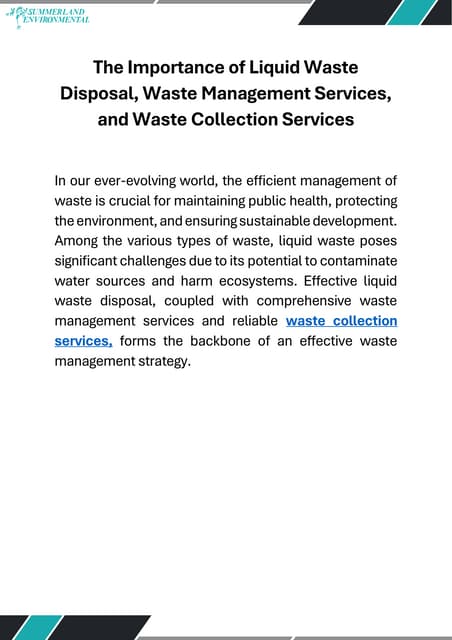The Buzz on Reclaim Waste
Table of ContentsTop Guidelines Of Reclaim WasteSome Known Details About Reclaim Waste Excitement About Reclaim WasteOur Reclaim Waste IdeasSome Known Incorrect Statements About Reclaim Waste
Discover the types, occurrences, and kinds of fluid waste. Domestic sewage waste describes the waste and products from a domestic septic storage tank. This kind of waste is produced by humans in houses, colleges, and other buildings. This only consists of septic storage tanks that have a drain field. The correct administration and disposal of domestic sewer waste call for fluid waste to be transferred to a sewage therapy plant where the proper methods and tools are related to purify and get rid of waste.
Industrial waste usually includes possible risks, such as combustible materials or a blend of fluid and solid waste products, and requires an advanced and comprehensive disposal procedure. The disposal of commercial waste commonly involves the filtering of waste prior to transportation to make certain secure and appropriate disposal. Hazardous waste is created from by-products and drainage of commercial processes and production.
This type of waste can not make use of the very same sewer monitoring transport or processes as septic or commercial liquids. The hazardous waste management process needs the inspection and testing of fluid waste before it goes through the disposal procedure (industrial wastewater treatment). Drainage waste is the fluid waste that comes from runoff and excess stormwater in highly inhabited areas or cities
Overflow waste can create contamination and flooding otherwise handled properly. Discover more regarding sewer cleaning and waste monitoring. Guaranteeing appropriate waste monitoring can prevent catastrophes and decrease ecological damage. Both people in residential settings and specialists in business or manufacturing markets can gain from understanding the processes and regulations of fluid waste administration.
Facts About Reclaim Waste Revealed
Contact PROS Providers today to discover our waste management and disposal solutions and the correct means to look after the liquid waste you create.
(http://peterjackson.mee.nu/do_you_ever_have_a_dream#c2256)Do you understand what occurs to your water when you end, purge the bathroom or drain the washing device? No? Well, it deserves knowing. This supposed 'wastewater' is not only a vital resource however, after treatment, will certainly be launched to our land, rivers or the sea. Used water from toilets, showers, bathrooms, kitchen sinks, laundries and industrial procedures is called wastewater.

water utilized to cool down equipment or tidy plant and tools). Stormwater, a kind of wastewater, is drainage that moves from farming and urban locations such as roofs, parks, yards, roads, paths and seamless gutters right into stormwater drains, after rain. Stormwater moves without treatment straight to local creeks or rivers, ultimately getting to the ocean.
Facts About Reclaim Waste Revealed
In Queensland, most wastewater is treated at sewage treatment plants. Wastewater is delivered from domestic or commercial websites via a system of sewers and pump stations, recognized as sewage reticulation, to a sewage treatment plant.
The Division of Natural Resources encourages city governments regarding handling, operating and keeping sewage systems and treatment plants. In unsewered locations, local federal governments might call redirected here for owners to set up private or household sewer treatment systems to deal with domestic wastewater from toilets, kitchens, shower rooms and washings. The Department of Natural Resources authorises using house systems when they are proven to be efficient.
A lot of stormwater gets no treatment. In some new class, treatment of some stormwater to eliminate trash, sand and crushed rock has actually begun making use of gross pollutant catches. Wastewater treatment takes place in four stages: Eliminates strong issue. Larger solids, such as plastics and other items wrongly discharged to sewers, are removed when wastewater is gone through screens.
Wastewater then moves right into large storage tanks where solids resolve and are removed as sludge. Grease and scum are skimmed from the surface. Uses little living organisms recognizes as micro-organisms to break down and remove staying dissolved wastes and fine fragments. Micro-organisms and wastes are incorporated in the sludge. Removes nitrogen and phosphorus nutrients that could cause algal flowers in our waterways and intimidate water life.
The Ultimate Guide To Reclaim Waste
Nutrient elimination is not readily available at all sewage treatment plants because it calls for expensive specialist equipment. Clear liquid effluent created after treatment may still contain disease-causing micro-organisms - liquid waste removal.

This generally implies wastewater needs to be dealt with or contaminants gotten rid of before it can be released to waterways. Most wastewater flows into the sewage system. Under the Act, local governments carry out authorizations and licences for ecologically relevant activities (Periods) involving wastewater launches that might have a neighborhood effect. The department provides authorizations and permits to Periods involving wastewater launches that may have a local or statewide impact.
Some Of Reclaim Waste
Surveillance gives accurate details concerning water high quality and can confirm that permit problems are being fulfilled. The info gotten via monitoring provides the basis for making water high quality decisions.